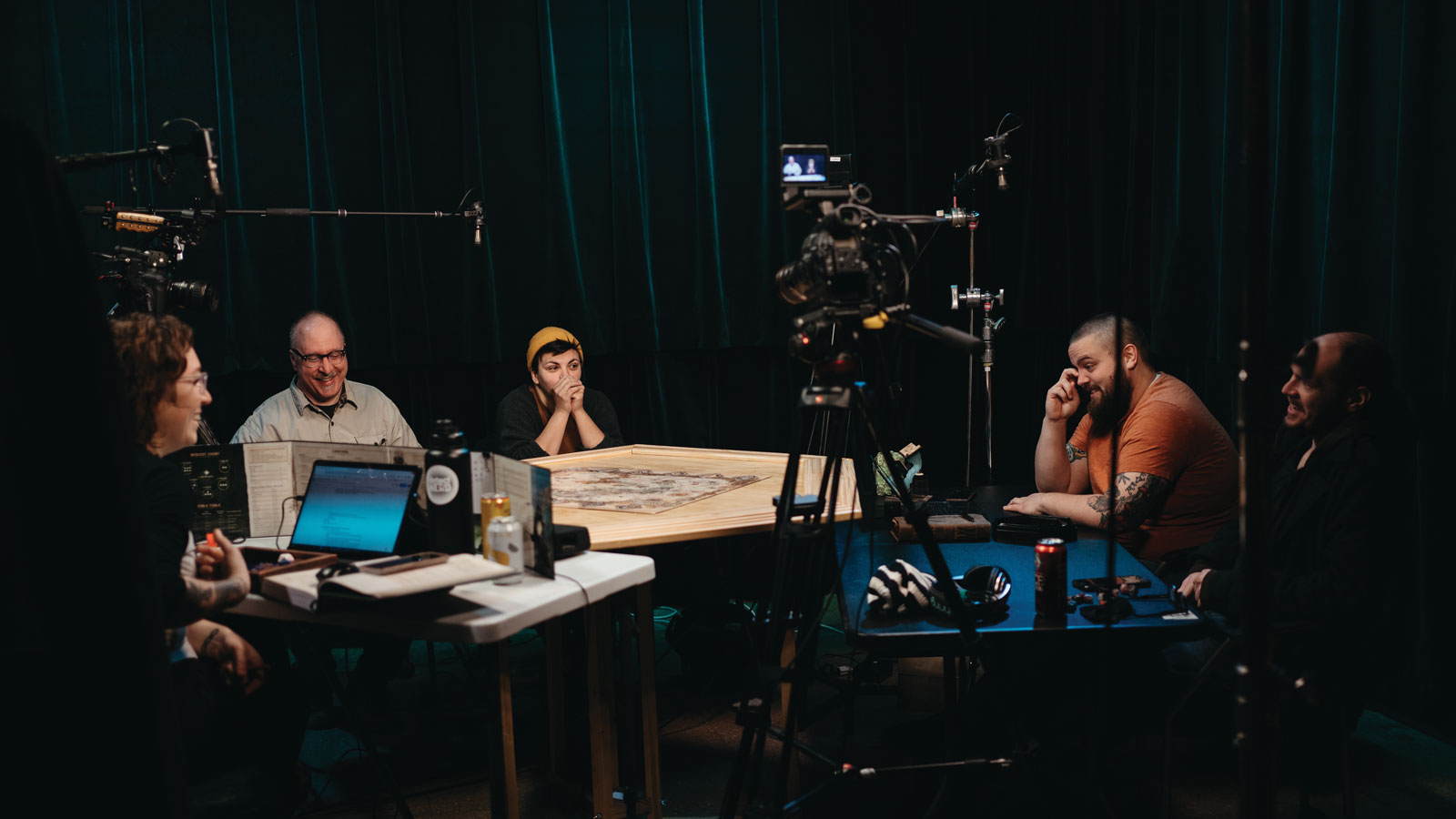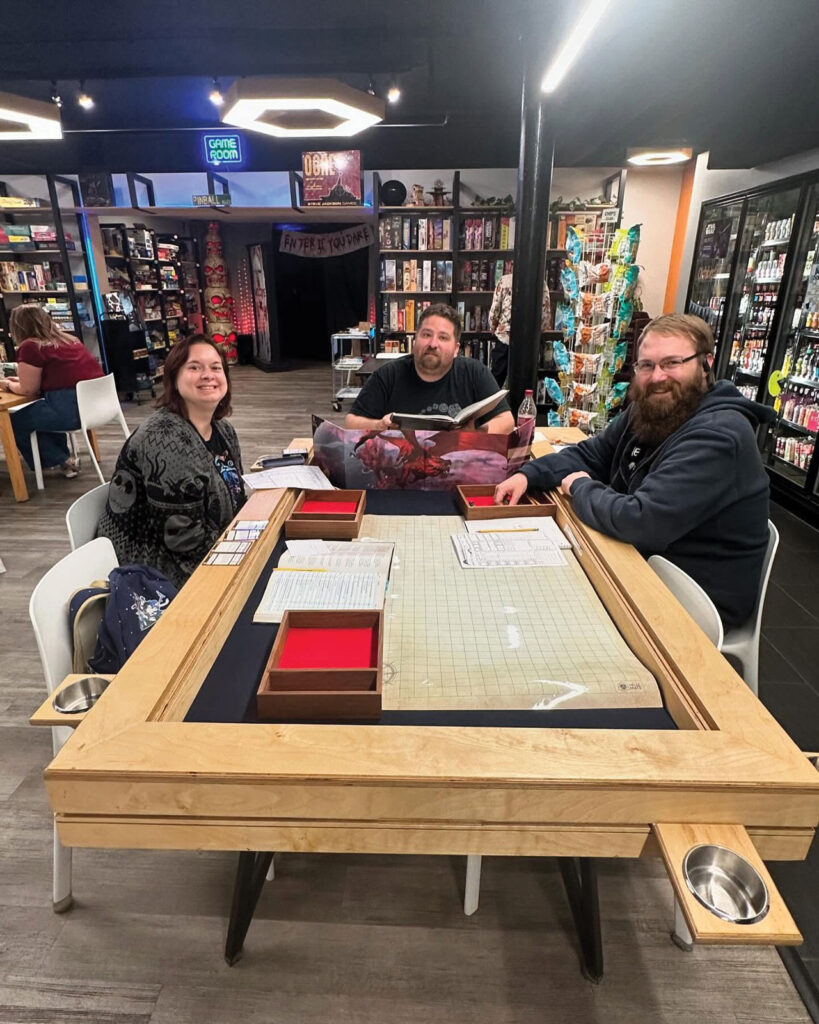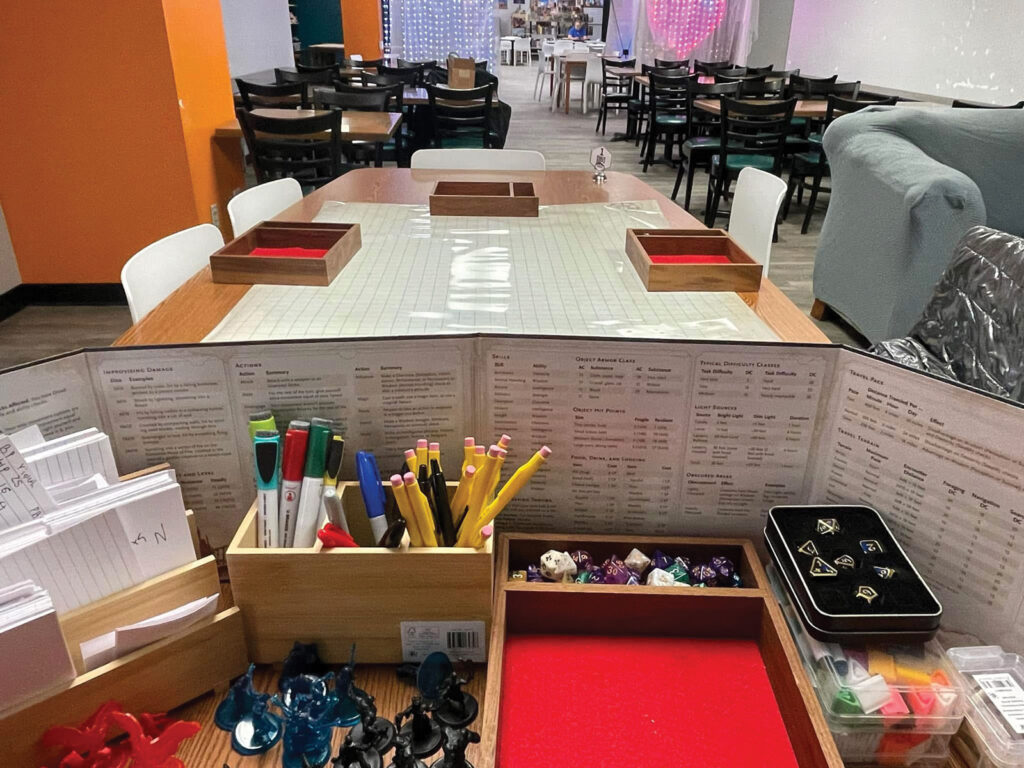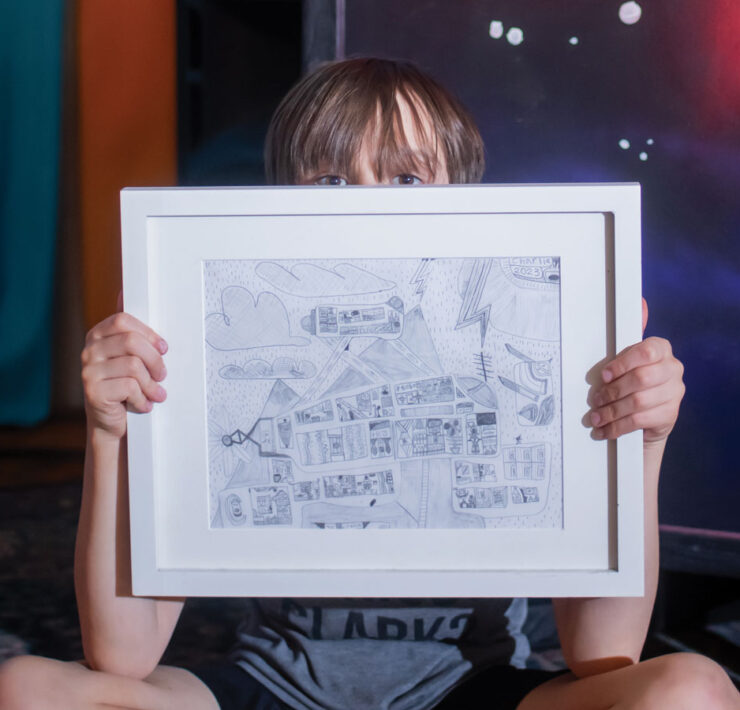Telling Stories, Slaying Dragons
- "Telling Stories, Slaying Dragons" originally appeared in the April 2025 "Art & Culture" issue of COMO Magazine.

Step into a world where imagination reigns, choices shape destiny, and adventure is only a roll away.
A heavy mist clings to the cobbled streets as the midnight bell tolls, its solemn chime swallowed by the dense fog rolling in from the harbor. Somewhere in the distance, a raven caws three times. Then silence.
A flickering lantern ahead barely illuminates a hooded figure, motionless except for the rhythmic tap of a silver ring against a wooden staff. Eyes, like embers smoldering in a dying fire, peer out from beneath the hood, watching, waiting.
“The pact you made … it stirs,” the figure says, its voice like the whisper of dry leaves. “And so the game begins.”
These words could come from a mysterious stranger in a fog-shrouded alley or from a Dungeon Master setting the stage for a night of adventure. This is the essence of Dungeons & Dragons, a game where imagination reigns and every choice shapes the journey.
The Game That Started It All
Dungeons & Dragons, commonly known as D&D or DnD, is a tabletop role-playing game (TTRPG) created in 1974 by Gary Gygax and Dave Arneson. Shortly after its release, the fantasy game featuring wizards, warlocks, orcs, and countless other fantastical elements became a nationwide sensation. Now, fifty years later, D&D has never been more alive. Across the country — and right here in Columbia — the game continues to bring people together, forging friendships and unforgettable stories.
Storyteller and Dungeon Master
For local D&D player Christopher Mooney, storytelling wasn’t just a passion — it was a profession. As a film producer, he was easily drawn to the narrative possibilities of the game after being introduced to Critical Role, an emerging content creator group focused on D&D storytelling, in 2016. Captivated by both the game and its unique approach, he soon saw the potential for his own D&D-inspired content.
“I realized I could do a show because I’m in film production,” Mooney recalls. “So, I went down that path; there were a lot of logistics involved, and it eventually became a podcast. We got about forty episodes up, and then the attendance kind of fizzled through. But that whole experience just got me more into D&D.”
After the podcast concluded, Mooney shifted his focus to sharing and teaching others how to play. Now, every Friday night at Hexagon Alley, he runs one-shot games — self-contained adventures that can be completed within a single three- to four-hour session rather than requiring the long-term commitment of an ongoing campaign.
While it might feel overwhelming to jump into the game as a newcomer, Mooney makes it as simple as possible by providing pre-generated characters (with references to the player’s handbook) and giving players a primer on the game. As the Dungeon Master (DM), he crafts the world and overarching plot, while player choices shape the story’s direction, making it a uniquely collaborative endeavor.
“What’s cool about D&D is that you get to tell a story with other people, and those people get to impact the story,” he says. “So, it’s kind of a mix between theater and improv.”
Friday night attendees are primarily adults, but Mooney will soon expand to hosting part of Hexagon Alley’s “After School Enrichment Program,” working with children ages 8 to 14. He believes D&D goes beyond tabletop fun, teaching kids valuable skills such as teamwork, social interaction, game mechanics, mathematics, and strategic thinking — including critical thinking about moral dilemmas.
The game benefits adults for the same reasons, especially for those who struggle to interact with others. Mooney describes the D&D community as highly inclusive, especially in his games.
“When we’re here, we’re here to slay dragons,” he adds. “I don’t care who you are. We’re here to explore cool dungeons, find cool magic items, and just have fun.”
He recommends that new players attend his Friday night one-shots at Hexagon Alley because the environment is safe, public, and inclusive, and he’s a knowledgeable DM who is sensitive to the needs of beginners.
He also emphasizes that games can be as simple or complex as players want them to be — from filming campaigns in costumes with professional cameras, lighting, and music to just sitting around a table with a few friends after a long day of work and blowing off steam in a one-shot. Either way, the game succeeds at bringing people together, whether for a few hours or a couple of months.
Elevating D&D into Entertainment
The D&D content-creator group Detect Nerd is a testament to the game’s community-building aspect and encapsulates both its professional and casual sides.
Detect Nerd, created by D&D enthusiasts Elizabeth Keach and Doug Miller, produces live D&D events and online content. However, its origins began in a smaller and more intimate setting.
“The first campaign that I was involved in was just a home game,” says Keach. “Just a group of friends that hung out around a table, and there was always a potluck and drinks. That’s where I first met Doug.”
Keach and Miller developed a strong bond after their characters formed a camaraderie during the campaign. They soon realized they shared similar play styles and philosophies. With their creative backgrounds in theater and music/graphic design, respectively, they recognized the potential to take the game from a friend’s table to a polished production.
Three years ago, with the assistance of Vidwest Studios, they gained access to professional microphones, cameras, and lighting to enhance their content. And thus, Detect Nerd was born. They currently have fifty-four videos uploaded to YouTube, featuring a mix of story-driven adventures and engaging game sessions.
“Detect Nerd welcomes any kind of nerd, whether you’re a plant nerd, or you like cars, and you’re just interested in an entertaining piece of content … I don’t care if you’ve ever played [D&D]. Our main thing is, ‘Do you enjoy what we’re putting out for you? Is it fun? Do you connect or relate to it?’ That’s what our goal is,” says Keach.
Keach and Miller’s goal of making the game accessible to all mirrors D&D’s evolution. Over its fifty-year history, D&D has shifted from strict adherence to the handbook to a more flexible, player-driven approach, though some groups still prefer the traditional style. Players can now incorporate a number of homebrews — custom content not found in the official rulebook, such as unique character classes, races, spells, and settings — into their games.
“These [newer] versions of D&D are really built to accommodate different kinds of people,” Miller adds. He describes Detect Nerd’s game style as more story-centered than technical, strategic, and dice-oriented, which may make it more approachable to novice gamers.
From hosting live shows to following online creators like Critical Role and Dimension 20, Detect Nerd has noticed a growing trend of “celebrating nerdiness” and fostering a strong community around the game, both virtually and in person.
“When we do live shows and talk to people in the audience, it’s amazing how many people in town are playing,” Miller says. “I think the Dungeon Master’s Guide tells you to ask your players what kind of players they are — whether they’re strategic, storytellers, or just there to make food and hang out. [D&D] really brings together all kinds of people in the community.”
Keach and Miller’s biggest advice for newcomers is to find a group where they feel comfortable opening up and being themselves. While there’s no right or wrong way to play, different players have different preferences and styles, so finding a group with a similar approach can make the experience more enjoyable.
They also emphasize that it’s okay to learn at your own pace — there’s no expectation to grasp everything right away. While the game has many moving parts, at its core, D&D is all about having fun.
Detect Nerd may bring back educational games at some point if it receives requests from interested players; In the meantime, for those eager to start an adventure, there are plenty of places in Columbia to roll the dice. Hexagon Alley, Valhalla’s Gate, and Magelings Games are all welcoming spaces for new and experienced players alike; more information can be found on their websites or social media pages.







